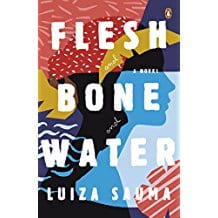By Emily Pedder
City short course alumna Luiza Sauma‘s first novel, Flesh and Bone and Water, will be published by Viking/Penguin in February 2017. To celebrate her brilliant achievement, we asked her to tell us more about how she writes.
What got you started with writing?
I realised that I wanted to be a writer when I was around fifteen. It was an incredibly cheesy epiphany: I was reading Jack Kerouac’s On the Road on a bus in north London, and suddenly the possibilities of literature opened up to me – you could experiment and you could write about anything, not just upper-class English people. I haven’t re-read the book since then, but I suspect it’s best experienced when you’re fifteen.
After that, I started writing obsessively: mostly diaries and a short-lived music zine, but also terrible poetry and fiction. After university I became a journalist and fiction fell by the wayside, but I returned to it in my late twenties.
What do you enjoy about writing?
The same things I enjoyed when I was a child: creating a world from scratch, and playing with characters, ideas and words. When it’s going well, it’s so much fun. David Foster Wallace said that writing used 97 percent of himself, while his other work used just 50 percent. I can relate to that – writing is so completely involving.
What do you find challenging?
The first draft is very challenging for me. I don’t like to plan too much, so it often feels like I don’t know what I’m doing – which is exciting, but scary. Like a lot of writers, I also struggle with procrastination and self-flagellation.
Which writers have inspired you?
I’m still inspired by some of my favourites from my teens, such as Truman Capote, Vladimir Nabokov, Ralph Ellison and Albert Camus, but also Toni Morrison, Chimamanda Ngozi Adichie, Carson McCullers, Elena Ferrante, Junot Díaz, Edward St Aubyn, Marlon James, Colm Tóibín, Kazuo Ishiguro, Lorrie Moore and many others.
Do you have any writing rituals?
I usually write at the library, because I’m prone to laziness when I’m at home. I can write at any time of day, but I never do it late at night, because it exacerbates my insomnia. I just write on a laptop – nothing too unusual. When I’m out and about, I take notes on my phone. I don’t write much by hand; my handwriting is so terrible, I can barely read it.
Which writing courses did you do at City and what did you gain from them?
I got quite addicted to City’s courses – I did Short Story Writing, Writers’ Workshop) and Screenwriting: First Steps. They gave me a much-needed escape from my day job, a safe place to play with ideas and, more than anything, the confidence to carry on writing. I went on to do the Creative and Life Writing MA at Goldsmiths, which I loved.
How did you get your novel published?
For me, it was all about finding a brilliant agent; things moved pretty quickly after that. I had dalliances with various agents – some had approached me, others I had approached – before I signed with Emma Paterson at RCW last summer. She helped me to do a few edits and then submitted the book to publishers in November. I received a few offers and decided to go with Viking/Penguin.
What would your advice for a new writer be?
Don’t pay too much attention to ‘rules of writing’ and don’t take criticism to heart. All writers can benefit from editorial advice; no one is a perfect genius. Not even Fitzgerald; Susan Bell’s book The Artful Edit provides a fascinating insight into how his editor, Max Perkins, helped him to improve The Great Gatsby. You don’t need to take on board everyone’s ideas, though – just the ones that resonate with you.
Most of all, just get on with it. As Dorothy Parker said, ‘Writing is the art of applying the ass to the seat.’
What are you working on now?
I’m working on some short stories and also a second novel, which is completely different to the first. I’m still feeling my way through the story.
Have you given up the day job?
I’ve just left my day job, because I needed a break to focus on my second novel. It’s definitely possible to write and work full-time (not just possible, but necessary – you’ve got to eat!), but it can be challenging. I don’t think work is the enemy, though; even the dullest office is rich with drama. I’m sure I’ll be back at another job sometime soon, but for now I’m just going to enjoy writing.













Recent Comments